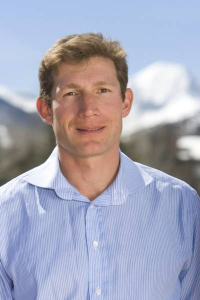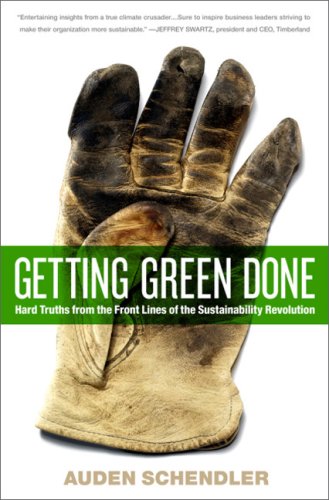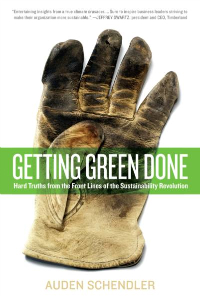Corporate sustainability guru Auden Schendler lays out the problem with corporate sustainability gurus in his recent Getting Green Done: Hard Truths from the Front Lines of the Sustainability Revolution. In doing so, he pretty much dares the nation’s copy editors to title their reviews with the decade’s most played-out headline: “It’s Not Easy Being Green.” Can they resist?
The book argues that environmental overhauls of corporations are not easy, nor are they necessarily profitable. And environmentalists who want corporations to green-up anyway would do well to talk straight with them about the difficulties.
Schendler finds that sort of honesty lacking in the proliferation of green-business cheerleading.
“Dig beneath the surface of one of the many green ‘success stories’ you read about in the news and you’ll frequently find something more like Apocalypse Now than a finely tuned operation,” writes Schendler, who has written for Grist. “This doesn’t mean we give up. But we need to recognize that it’s one thing to watch a PowerPoint presentation on corporate sustainability, and another thing to make it real.”
He draws examples from his day job, executive director of sustainability at Aspen Skiing Company. In his early days there, he approached the manager of the company’s Little Nell Hotel with the idea of using compact florescent bulbs in the guest rooms. Schendler promised the move would save on energy costs, replacement bulbs, and staff time, paying for the cost of switching in less than a year (a win-win-win, if you will). The manager, with a five-star reputation to preserve, promptly shot him down.
“When you go to Las Vegas and stay in a Motel 6, they have compact fluorescent bulbs,” he told Schendler. “This isn’t a Motel 6.”
If reducing the environmental impact of a high-end ski resort brings unique challenges, it also exposes Schendler to some obvious criticisms. In fact, he suggests a few of them: Aspen can afford solutions that other places can’t. Ski resorts are more interested in polishing their image than in achieving global change. And an industry reliant on disposable income, jet travel, and second homes has no right to preach to the rest of us.
Schendler responds, in part, that the world needs test labs — or canaries in the coal mine. Even wealthy ones. Aspen can help craft a roadmap to sustainability because it can afford to fail in some experiments. Perhaps less convincingly, he argues that the lavish Aspen lifestyle is an advantage here, making the town a good microcosm for the lavish American lifestyle at large.
On the question of image-polishing, Schendler argues that every “green” claim a company makes opens it up to more environmental scrutiny, which in turn encourages more thorough greening. This makes corporate greenwashing a good thing, he says, even though it’s deceitful by nature. Scrutiny from customers, employees, watchdog groups, the public, and the press holds the company accountable to its environmental claims, and “painting a business green invariably steers it toward improved practices.”
But wouldn’t corporate honesty (laugh if you must) be better and more efficient to begin with? And what about false claims that are never exposed? Schendler doesn’t have much to say on this, which is why this happily counterintuitive section feels a little thin.
The book fairly brims with Schendler’s playfulness, though. You get a sense that the 38-year-old feeds off the unavoidable conflict his job involves — with both the mechanics in the plow shop and the suits in the board room.

Auden Schendler
Schendler claims blue-collar cred from his time as a “weatherization technician” in a low-income housing program. “It sounds fancy, but it means that I crawled under mobile homes [to install installation] through mud and animal carcasses into spaces so small I couldn’t turn my head,” he writes. That work convinced him the sustainability movement requires “more grunts, fewer visionaries,” and that for innovations such as biodiesel engines to catch on, they need to win over the grunts who actually use them.
As for working in boardrooms and business conferences, Schendler says everybody with “environment” or “sustainability” in their title labors under the disadvantage of being lumped with hippie scolds — the product of a cultural “70s hangover”:
I’m guessing that many, when delivered a pitch on efficiency from an environmental officer, hear: “Patchouli. Birkenstocks. Hairy armpits. Street protestors telling you to abandon your car, take cold showers, shoot your television, and use bad lighting or none at all.” Add a dose of perceived condescension and righteousness from the average enviro manager, and that can seem fully inappropriate for a corporate setting. These responses are understandable, but they miss what’s on the table for discussion.
He cringes at the woman at a sustainable business conference who announces “I cry for the earth,” knowing she makes it that much easier for skeptical executives to write off his message.
But he also acknowledges that green business leaders must be willing to speak about a moral mandate. Quite a few green business measures, particularly energy efficiency projects, will pay for themselves quickly. But profitability won’t justify all of them. Or the payoff will take too long to interest CFOs focused on quarterly reports.
The book more or less delivers on the title’s promise of “hard truths.” Schendler includes a sober assessment of recent climate science, refuses to take comfort in personal-behavior improvements like reusable shopping bags, and attacks renewable energy credits (RECs), long a darling of corporate greening-up programs. (Read a version of his REC critique on Climate Progress).
Yet another chapter provides a persuasive critique of the LEED building certification program: In short, energy use outweighs every other factor in green building, but LEED doesn’t reflect this.
If this all sounds like a wide range of topics, it is. But Schendler’s bald enthusiasm for wrestling with such problems holds the book together. Anyone with a passing interest in these issues would likely find it engaging reading. And for corporate sustainability officers, it should be required.




